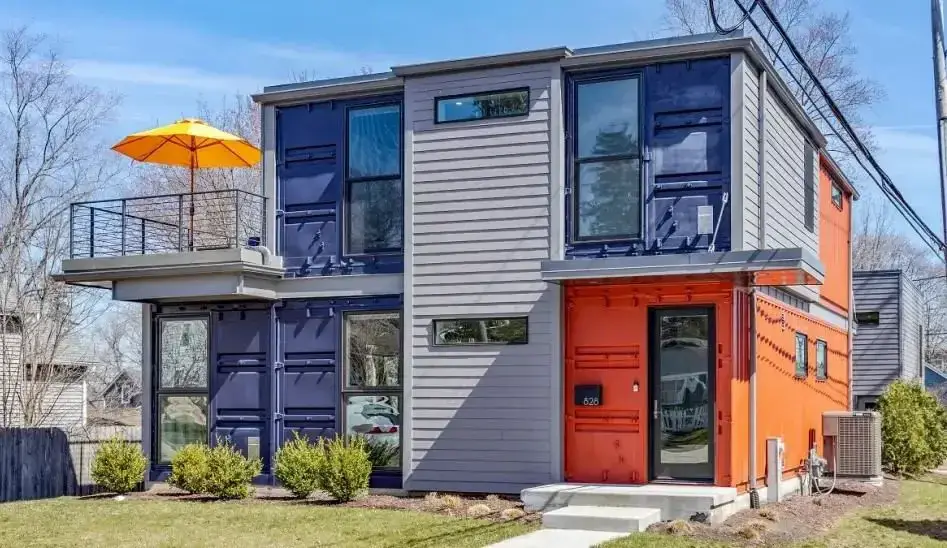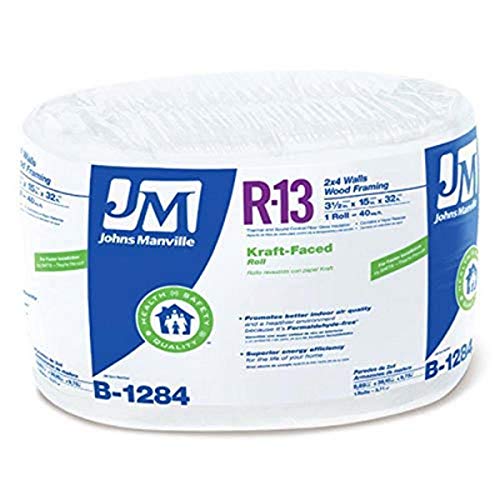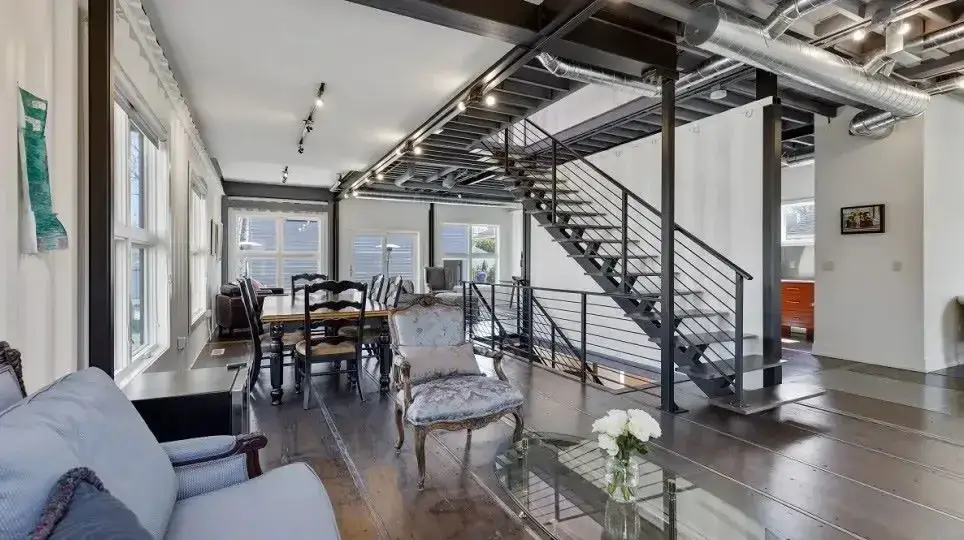Looking to see if intermodal shipping container homes are legal in Chicago? Yes, sea container homes are legal in the Windy City. To begin with, container homes, also known as shipping container houses, are dwellings made from repurposed shipping containers.
These containers are typically designed for transportation, but due to their durability and affordability, they have gained traction as an alternative housing option.
In recent years, container homes have seen a surge in popularity and are attracting more interest from individuals seeking unique and sustainable living solutions.
With their sleek and modern designs, container homes have captured the imagination of many who wish to simplify their lives or reduce their environmental impact.
At HomeSolarWind, we understand the growing fascination with container homes and the desire to explore this housing option within the confines of Chicago’s regulations.
So, in this content plan, we aim to break down the legality of container homes in Chicago, helping you navigate the local regulations and discover the possibilities for embracing this innovative form of housing.
Table of Contents
Zoning Regulations for Intermodal Container Homes in Chicago

Understanding the zoning regulations in Chicago is essential when considering the legality of container homes. These regulations play a crucial role in determining where and how container homes can be built within the city.
A. Definition and Importance of Zoning Regulations
Zoning regulations are a set of rules and guidelines established by local governments to regulate land use and development within specific areas.
These regulations are important as they aim to maintain the character and functionality of neighborhoods, ensuring compatibility between different land uses.
Read More on Are Container Homes Legal in BC? Interesting Review
B. How Zoning Regulations Impact Container Homes Legality
Zoning regulations directly impact the legality of container homes in Chicago. Depending on the specific zoning designation, container homes may or may not be permitted in certain areas.
It is important to research the zoning regulations before considering the construction of a container home.
C. What to Remember About Zoning Regulations in Chicago
- Residential vs. Commercial Zoning: Zoning regulations differentiate between residential and commercial areas, with different restrictions and allowances for each. Understanding the zoning designation of your desired location is essential to determine if container homes are permitted.
- Specific Neighborhoods or Areas with Different Zoning Restrictions: Some neighborhoods or areas within Chicago may have specific zoning restrictions that differ from the overall city regulations. Researching the specific zoning regulations for your desired location is crucial.
D. Potential Difficulties and Requirements to Meet Zoning Regulations
- Building Size and Setback Requirements: Zoning regulations often specify limitations on building size, including height and setbacks from property lines. Ensuring that a container home meets these requirements is necessary for compliance.
- Regulations on Accessory Dwelling Units: If using a container home as an accessory dwelling unit (ADU), additional regulations may apply. It is important to research and adhere to any regulations specific to ADUs.
Read More on Are Container Homes Legal In The UK? – Taboo Homes
Building Codes in Chicago
A. Definition and Purpose of Building Codes
Building codes are a set of regulations and standards that are enforced by local governments to ensure the safety, health, and welfare of the public.
The purpose of these codes is to establish minimum requirements for construction and to regulate various aspects of building design, materials, and construction methods.
B. How Building Codes Affect Container Homes Legality
Building codes play a significant role in determining the legality of container homes in Chicago. Since container homes are a unique form of construction, they need to meet specific requirements and comply with building codes to be considered legal dwellings.
C. Essential Building Code Standards for Container Homes
- Structural integrity and safety measures
Container homes must adhere to the building codes’ structural integrity and safety standards. This includes ensuring that the containers are properly secured and reinforced to withstand the local climate, wind loads, and seismic forces.
- Plumbing, electrical, and HVAC requirements
Container homes need to meet the plumbing, electrical, and HVAC requirements specified in the building codes. This involves installing proper insulation, wiring, plumbing fixtures, and ventilation systems to ensure the comfort and safety of occupants.
| Image | Product Title | Features | Price |
|---|---|---|---|
 | Buy on Amazon | ||
 | Buy on Amazon | ||
 | Buy on Amazon |
Read More on Container Home Builders in Virginia: Avoid The Unscrupulous
D. Ensuring Compliance with Building Codes in Chicago
- Hiring licensed professionals
To ensure compliance with building codes, it is crucial to hire licensed professionals who are knowledgeable about container home construction and familiar with the local building codes in Chicago.
- Inspections and certifications
Container homes need to undergo thorough inspections by building code officials at various stages of construction. Obtaining the necessary certifications and permits is essential to demonstrate compliance with the building codes.
Permits and Planning Process
When it comes to building container homes in Chicago, there are certain permits and a planning process that you must adhere to. Understanding these requirements is crucial to ensure a smooth and legal construction process.
A. Overview of the Permit and Planning Requirements
Before commencing any construction, it is important to familiarize yourself with the permit and planning requirements in Chicago. These regulations are in place to guarantee the safety and compliance of all building projects in the city.
Read More on Is Planning Permission Needed For Container Home? Expert Guide
B. Understanding the Types of Permits Needed for Container Homes
Container homes, similar to traditional homes, require various permits in Chicago. These can include building permits, electrical permits, plumbing permits, and occupancy permits.
Each permit serves a specific purpose and ensures that the container home meets all necessary standards.
C. Key Steps and Considerations in the Planning Process
The planning process for container homes involves several important steps and considerations:
- Site selection and land use permissions: Choosing an appropriate location for your container home and obtaining the necessary land use permissions are critical steps in the planning process.
- Environmental impact assessments (EIA): Assessing the environmental impact of your container home is essential to address any potential concerns and ensure compliance with environmental regulations.
- Architectural and engineering plans: Developing detailed architectural and engineering plans is crucial to demonstrate the structural integrity and safety of your container home.
Read More on How To Get Permits For Container Homes In Florida
D. Challenges and Potential Delays in Obtaining Permits

While the permitting process for container homes in Chicago can be successfully navigated, it is important to be aware of the potential challenges and delays that may be encountered. These can include paperwork requirements, inspections, and any necessary revisions to plans.
Read More on Can You Put a Basement Under a Shipping Container Home?
Potential Restrictions on Container Homes in Chicago
A. Interpreting Specific Neighborhood or Area Restrictions
When considering building a container home in Chicago, it is essential to carefully examine and interpret specific neighborhood or area restrictions.
Different neighborhoods may have their own unique zoning regulations and restrictions. Therefore, it is crucial to familiarize yourself with the specific guidelines for your desired location.
B. Researching Planned Developments and Community Associations
Researching planned developments and community associations can provide valuable insights into any potential restrictions on container homes in Chicago.
These organizations often have their own regulations that should be taken into account before proceeding with your container home project.
C. Impact of Historical Preservation Areas or Landmarks
Container homes located within historical preservation areas or landmarks may face additional restrictions due to the cultural significance and architectural importance of these areas.
It is crucial to consider the impact of such restrictions on your container home project and consult with the relevant authorities to ensure compliance.
D. Addressing Potential Restrictions Through Variances or Exemptions
In some cases, container home builders may need to seek variances or exemptions to address specific restrictions in Chicago.
By understanding the local procedures for obtaining variances or exemptions, you can navigate potential issues more effectively and increase the chances of your container home being deemed legal.
Read More on Is It Cheaper To Build A Barndominium Or Container Home? Easy
Local Chicago Ordinances and Bylaws
In order to determine whether container homes are legal in Chicago, it is crucial to understand the local ordinances and bylaws that govern the construction and use of these unique dwellings.
A. Importance of local rules in container home legality
Local rules and regulations play a significant role in determining the legality of container homes in Chicago. It is essential to familiarize yourself with these rules to ensure compliance and avoid any potential legal issues.
B. Searching for any specific ordinances related to container homes
When considering building a container home in Chicago, it is advisable to conduct thorough research to identify any specific ordinances that may pertain to these types of structures.
This can be done by consulting the Chicago Department of Buildings or seeking guidance from a professional familiar with local building regulations.
C. Understanding allowances, restrictions, or guidelines from local bylaws
Local bylaws may outline allowances, restrictions, or guidelines related to container homes. These regulations could include factors such as setbacks, size limitations, foundation requirements, and aesthetic considerations. Understanding and adhering to these provisions is crucial to ensure compliance with local regulations.
D. Considering potential future changes in regulations
While container homes may currently be legal in Chicago, it is important to consider potential future changes in regulations. Municipalities can update their bylaws and ordinances over time, potentially impacting the legality and viability of container homes.
Staying informed about any proposed changes can help you make educated decisions about your container home project.
Public Opinion and Acceptance
A. Evaluating the general sentiment towards container homes in Chicago
Container homes have gained traction in recent years as a sustainable and affordable housing solution. However, it is important to assess the general sentiment towards these homes in the specific context of Chicago. Are residents open to the idea of container homes as a viable housing option?
B. Importance of public acceptance in practicality and feasibility
The practicality and feasibility of container homes in Chicago heavily rely on public acceptance. Public opinion plays a significant role in shaping zoning regulations, permitting processes, and local ordinances. Without public acceptance, the implementation of container homes may face significant obstacles.
C. Identifying challenges and opportunities based on public opinion
Understanding public opinion towards container homes in Chicago enables us to identify the challenges and opportunities associated with their adoption. By studying sentiments and concerns expressed by the community, we can address potential roadblocks and leverage opportunities to foster acceptance.
D. Engaging with community input and addressing concerns
The key to achieving public acceptance of container homes lies in actively engaging with the community. Listening to their input, addressing concerns, and providing accurate information can help alleviate any apprehensions.
By involving the public throughout the planning and implementation process, we can ensure their voices are heard and their concerns are addressed.
Read More on Shipping Container Home In Adelaide – Expert Review
Sustainable Housing Initiatives in Chicago
A. Exploring Existing Sustainable Housing Programs and Initiatives
Chicago has been at the forefront of promoting sustainable housing practices. The city has implemented several programs and initiatives aimed at fostering environmentally friendly living. These include:
- Green Homes Program: This program encourages homeowners to make energy-efficient upgrades to their homes, such as installing solar panels, improving insulation, and using sustainable building materials.
- Chicago Sustainable Development policies: The city has established policies that prioritize sustainable building practices, including the use of renewable energy sources, rainwater harvesting systems, and green roofs.
- Chicago Sustainable Neighborhoods Program: This program focuses on developing sustainable neighborhoods that promote walkability, access to public transportation, and the use of green spaces.
B. Assessing the Alignment of Container Homes with Sustainability Goals
Container homes offer several sustainable advantages that align with the goals of these initiatives. They are constructed using repurposed shipping containers, which reduces waste and promotes recycling.
Additionally, container homes can incorporate energy-efficient features such as solar panels and green insulation materials, helping to minimize their carbon footprint.
C. Potential Support or Incentives for Container Homes From Initiatives
While container homes are not explicitly mentioned in existing sustainable housing initiatives, there may be opportunities for support and incentives.
For example, the Green Homes Program could offer incentives or grants for homeowners who choose to build container homes with sustainable features.
Similarly, the Chicago Sustainable Development policies could be expanded to include guidelines specifically tailored to container homes.
Read More on Complete Advantages and Disadvantages Of Solar Panels
D. The Role of Sustainability in Legalizing Container Homes in Chicago
Sustainability plays a crucial role in the efforts to legalize container homes in Chicago. By highlighting the environmental benefits of container homes and showcasing their ability to align with existing sustainable housing initiatives, proponents of container homes can make a strong case for their legalization.
By all means, emphasizing the potential for energy efficiency, reduced waste, and resource conservation can help garner support from policymakers and the public alike.
Case Studies and Precedents
When it comes to container homes in Chicago, it’s important to examine previous case studies and precedents to understand the legal landscape and potential challenges.
By analyzing how similar projects were handled in the past, we can gain insights into the likelihood of container homes being considered legal.
A. Researching Previous Cases or Precedents Related to Container Homes
Before considering container homes as a viable housing option in Chicago, it is crucial to conduct thorough research on previous cases or precedents related to container homes.
And so, by studying these cases, we can gather valuable information on the legal framework and regulations surrounding container homes in the city.
Read More on Shipping Container Storm Shelter Cost: All You Need to Know
B. Analysis of How Similar Projects Were Handled in the Past
An in-depth analysis of how similar container home projects were handled in the past can provide valuable insights into the challenges and opportunities that may arise.
By understanding the decisions made in previous cases, we can better prepare for potential obstacles and develop strategies for navigating the planning and approval process.
C. Insights Into the Legal Landscape and Potential Challenges
Examining case studies and precedents also allows us to gain insights into the current legal landscape and potential challenges that may arise when seeking approval for container homes in Chicago.
At any rate, these insights will help us navigate the intricacies of zoning regulations, building codes, permits, and local ordinances that may impact the legalization process.
D. Implications for the Likelihood of Container Homes Being Considered Legal
By analyzing case studies and precedents, we can assess the implications for the likelihood of container homes being considered legal in Chicago.
And so understanding how previous projects were approved or denied can provide valuable guidance in shaping our approach to advocating for container homes as a sustainable and viable housing solution.
Advantages and Disadvantages of Container Homes
A. The Benefits of Container Homes in Chicago
1. Affordability and cost-effectiveness: Container homes are a cost-effective solution for housing in Chicago. The use of repurposed shipping containers reduces construction costs significantly.
2. Durability and structural integrity: Container homes are designed to withstand harsh weather conditions and are built to last. Their solid steel construction ensures durability and structural integrity.
3. Customizability and flexibility: As I have noted, container homes can be customized to suit individual preferences. They offer flexibility in design, allowing homeowners to create unique living spaces that cater to their specific needs.
B. Understanding the Drawbacks or Challenges of Container Homes
1. Insulation and energy efficiency concerns: Container homes may have insulation challenges due to their metal structure. Without doubt, proper insulation is crucial to ensure energy efficiency and comfort.
2. Limited space and potential size restrictions: Container homes often have limitations in size. The use of standard shipping containers may result in restricted living space, which might not be suitable for everyone. For this reason therefore, consider purchasing a high cube shipping container so as to get extra head room.
3. Perception and aesthetics challenges: Some individuals may have reservations about the aesthetics of container homes. Overcoming the perception of living in these unconventional structures can be a challenge.
Read More on Best Shipping Container Paint – To Protect And Enhance
Strategies for Legalizing Container Homes in Chicago
Legalizing container homes in Chicago requires careful planning and collaboration. Here are some strategies to consider:
A. Examining Successful Strategies and Best Practices
Certainly, one way to pave the way for container homes in Chicago is by studying successful strategies implemented in other cities.
By researching how container home communities have been legalized elsewhere, we can identify best practices and adapt them to fit Chicago’s unique context.
B. Learning From Organizations or Individuals who Have Paved the Way
As has been noted in passing, it’s important to seek guidance from organizations or individuals who have already made progress in legalizing container homes.
By learning from their experiences and success stories, we can gain valuable insights into overcoming challenges and building support within the community.
C. Identifying Key Steps and Considerations for Legalizing Container Homes
Developing a clear roadmap is essential for legalizing container homes in Chicago. This includes identifying key steps and considerations, such as engaging with local government officials, advocating for necessary policy changes, and addressing concerns related to zoning and building codes.
By carefully planning each stage of the process, we can increase the likelihood of success.
D. Collaboration and Advocacy for Policy Changes or Amendments
Building a strong coalition of supporters is crucial for legalizing container homes in Chicago. As a matter of fact, by fostering collaboration and engaging in advocacy efforts, we can build momentum and rally support from residents, community organizations, and key stakeholders.
This includes advocating for policy changes or amendments that will enable container homes to thrive in Chicago.
Read More on Best Shipping Container Lock For Safe Transportation and Storage
Project Cost Estimation
A. Understanding the Factors Influencing Project Costs
When estimating the costs of a container home project in Chicago, it is essential to consider several key factors:
- Size and complexity of the container home: The size and level of complexity of the container home design will significantly impact the project’s overall cost. Larger and more intricate designs may require additional materials and labor, resulting in higher expenses.
- Site preparation and foundation requirements: Site preparation, including land clearing, leveling, and foundation installation, is a crucial aspect of container home construction. All in all, the condition of the chosen site and the foundation requirements can affect the project’s costs.
- Materials, labor, and professional services: The costs of materials, such as shipping containers, insulation, roofing, electrical and plumbing systems, will influence the overall expenses. Additionally, labor costs and professional services, such as architectural and engineering fees, should be considered.
B. Estimating the Range of Costs Associated with Container Homes in Chicago
The cost range for container homes in Chicago can vary greatly depending on the factors mentioned above. On average, a container home project in Chicago can range from $50,000 to $150,000 or more.
However, it is important to note that each project is unique, and costs may significantly differ depending on individual requirements and design choices.
C. Additional Considerations for Budgeting and Financial Planning
When budgeting and planning for a container home project in Chicago, it is crucial to take into account additional considerations:
- Permit and licensing fees: Firstly, obtain information about the necessary permits and licenses required for container home construction in Chicago. These fees should be included in the budget.
- Utility connections: Secondly, consider the costs associated with connecting the container home to utility services, including water, electricity, gas, and sewage systems.
- Furniture and interior fittings: Next, budget for the furnishings and interior fittings required to make the container home livable and comfortable.
- Insurance: Finally, take into account the costs of insuring your container home to protect it against potential damages.
By considering these additional aspects, you can develop a comprehensive budget and ensure smooth financial planning for your container home project in Chicago.
Read More on Container Home Builders in Tennessee: Promising Sustainability
Conclusion
After thorough research and analysis of various aspects related to container homes in Chicago, we have come to several key findings and takeaways.
- Zoning regulations and building codes play a crucial role in determining the legality of container homes in Chicago. It is essential to understand and comply with these regulations to avoid legal issues.
- The permitting and planning process involves several steps and can be complex. Seeking expert guidance can greatly simplify this process and ensure compliance with the necessary legal requirements.
- Potential restrictions on container homes in Chicago may vary depending on the specific location and neighborhood. It is important to research and understand these restrictions before investing in a container home.
- Local ordinances and bylaws may provide additional guidelines that container home owners must adhere to. Familiarizing yourself with these regulations is crucial to maintaining compliance.
- Public opinion and acceptance of container homes in Chicago are gradually evolving. Engaging with the community and addressing concerns can help foster acceptance and create a positive environment for container home projects.
- As can be seen, Chicago’s sustainable housing initiatives provide an opportunity for container homes to contribute to the city’s eco-friendly goals. Incorporating sustainable practices in the design and construction of container homes can have positive impacts.
- Without a doubt, by studying relevant case studies and precedents, we can gain insights into how container homes have successfully been legalized in other cities. These examples can inform our strategies and approaches for gaining legal recognition in Chicago.
- Container homes offer several advantages such as affordability, durability, and versatility. However, it is important to consider and mitigate any potential disadvantages such as insulation challenges or limited design options.
Finally
In conclusion, anyone interested in exploring container homes in Chicago should undertake thorough research and engage experts in the field. Understanding and complying with the legal considerations, including zoning regulations, building codes, permits, and local ordinances, is crucial.
By doing so, we can create a sustainable and innovative housing solution while adhering to the legal framework of the city.
Read More on Container Home Airbnb Rentals In North Carolina – Unique Charm

